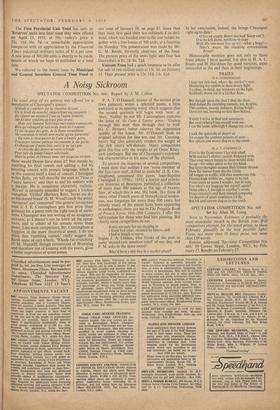A Noisy Sickroom
SPECTATOR COMPETITION No. 466: Report by J. M. Cohen
The usual prize of six guineas was offered for a translation of Cbassignee.s. sonnet: Malade je couchois sur la chambre deviant Oil le bruit du marcite, empeschant ma paupiere De cligner an sommeil rune et l'autre lumiere, Me fit firer soudain au logis plus avant: Mais test hunteur fiebvreux mes espris esmouvant, Bien qu'eslougne je sois et du bruit de l'orniere, Et du cacquet des gens, de la flame meurdriere Me consume, et recuit non mains. qu'au-paravant:
En vain je veus passer de Tune a l'autre porte,
Tousjours mestne parlour moymesme je me porte, Et changeant d'autre lieu, attire je ne suis pas.
Je cherche des desers la vaste solitude Pour fuir du palais l'aigre solicitude, Mais la peine, et l'ennuy nous suit jusqu'au trespas.
How would Donne have done it? Not merely by doubling his final vowels and adding e, but by blending conceit with prosaic language, which is in this context itself a kind of conceit. Chassignet writes flatly, yet will describe the eyes as 'rune et l'autre lunnere,' and likes to end his sonnets with a maxim. He is sometimes extremely realistic. 'Remit' is certainly intended to suggest a kitchen metaphor. 'Grilled' (Barbara Roe), 'burns me dry as blackened bread' (S. M. Wood) catch the point; 'devoured' and 'consumed' (the general favourites) miss it. J. E. Cunningham gets first prize (four guineas) for a poem with the right touch of earth- iness. Chassignet was not writing of an imaginary sickness; as a doctor's son he knew all the symp- toms, and in others of his sonnets wrote them down. Like most competitors, Mr. Cunningham is happiest in the more theoretical sestet; I do not think that 'rumbling runnels' really suggest the harsh noise of cart-wheels, 'Wheels rut-crunching' (S. M. Mansell), though reminiscent of Browning and therefore out of keeping with the poem, gives a better impression of street noises. P. A. T. O'Donnell, winner of the second prize (two guineas), writes a splendid poem, a little awkward in its opening word, which suggests that the second quatrain will begin with 'next' or `them'. Neither he nor Mr. Cunningham captures the force of 'de rune a l'autre porte.' Useless through This door then through that to trail' (G. C. Hutson) better conveys the oppressive quality of the house. Mr. O'Donnell finds an original solution for line ten, and Mr. Cunning- ham's 'lug' also admirably renders the weight of the sick man's self-distaste. Many competitors gave this line only the weight of an Omar Khay- yam apothegm. But one of Chassignet's outstand- ing characteristics in his sense of the physical.
To answer the inquiries of several competitors, I must state that neither I nor 'some member of the Spectator staff, skilled in pastiche' (J. E. Cun- ningham), composed this poem. Jean-Baptiste Chassignet (c. 1570-c. 1635), a lawyer and provin- cial historian of Besancon, published a collection of more than 400 sonnets at the age of twenty- four, of which this is one. His book, like those of many other French poets of Metaphysical tenden- cies, was forgotten for more than 300 years, but latterly many of his pieces have been appearing in anthologies; there are ten in The Penguin Book of French Verse, 16111-18th Centuries. I offer this information for those who find him pleasing. But clearly some competitors do not.
It was not easy for me sleeping in a front bed-sitter, strained by illness, and 1 had at length to move, begins J. A. Lindon, who thinks of the poet as some 'second-rate sensitive mind' of our day, and P. M. asks in the same mood : Who'd have a sick-bay in a market-place? In her conclusion, indeed, she brings Chassignet right up to date :
0 for an empty desert marked 'Keep outl, 0 to be left alone, not have to cope With life one must live up to!—what a hope!— Here's Angst, the sneaking conscientious Kraut I
Honourable mention goes not only to those from whom I have quoted, but also to H. A. C. Evans and H. Hardman for good versions, more successful at the end than in their beginnings.
PRIZES
(J. E. CUNNINGHAM)
I kept my sick-bed, where the market's roar, Hindering my eyelids in their weary fight To close, in sleep, my windows on the light, Suddenly drove me to a further floor.
But though upon the chat I shut the door. And dulled the rumbling runnels, yet, in spite, This restless, moody sickness, flaring bright, Destroys me, burning no less than before.
Vainly I strive to find new sanctuary, But everywhere I lug myself with me : I am the same, although I change my room.
I seek the quietude of desert air
To escape the anxious palaces of care— But spleen and worry dog us to the tomb.
(P. A. T. O'DONNELL)
First in the front room I lay sick abed. With market's clatter, eyelids flickered wide That over weary lamps to sleep would slide; So up—for other place to lay my head. But fever thoughts resume their frantic thread How far soever from the din I hide Of tongue or traffic; still that murderous tide Flames high within me, raging to be fed. From scene to scene 1 wander, but in vain, For what's my baggage but myself again? None other, I, though in another's room. From courtiers and their tainted sympathy To deserts of giant emptiness I'd fly, But irk and sorrow dog us to the tomb.






































 Previous page
Previous page